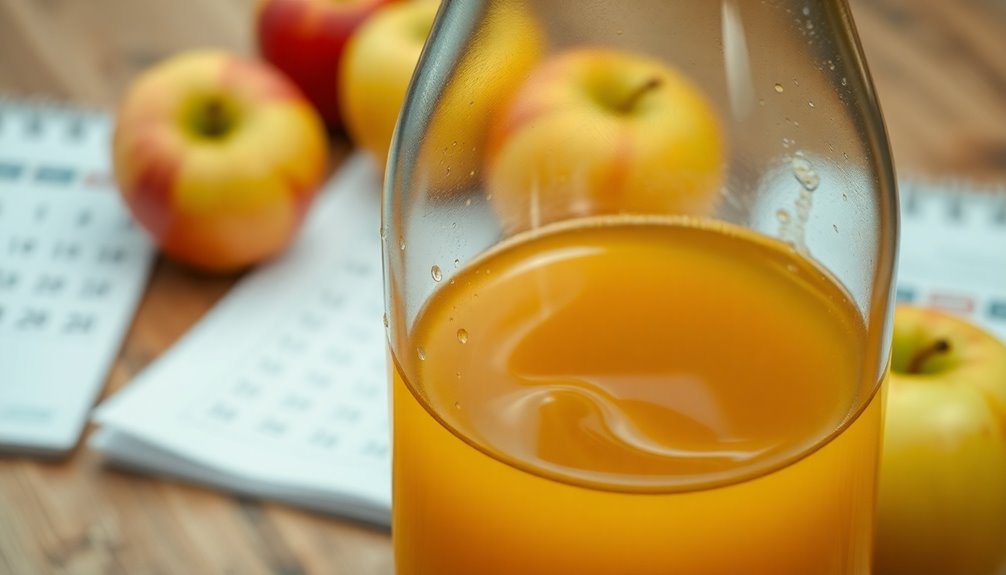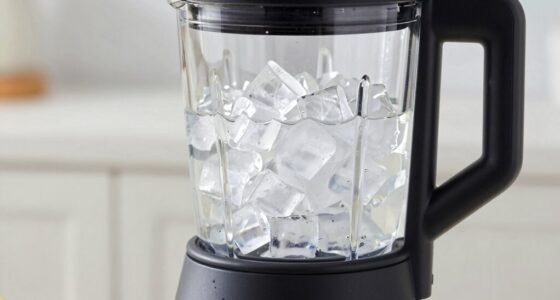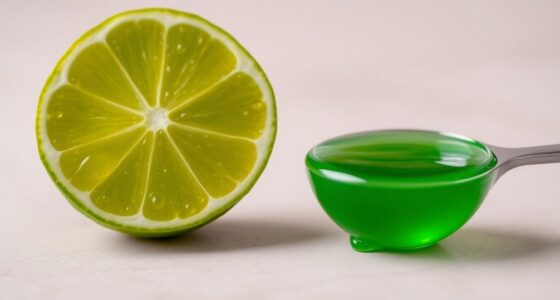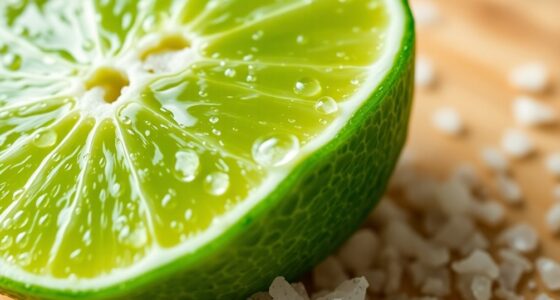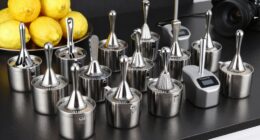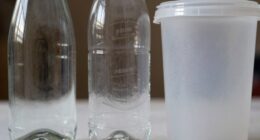Once you open apple juice, the shelf life varies by type. Store-bought and canned apple juice lasts about 7 to 10 days when refrigerated. In contrast, cold-pressed and homemade varieties only last 2 to 3 days due to the lack of preservatives. Always check for signs of spoilage, like off odors or discoloration. Remember, proper storage is essential for maintaining freshness. Keep on going to discover more tips on how to preserve your juice!
Key Takeaways
- Store-bought and canned apple juice last about 7 to 10 days after opening, requiring proper refrigeration.
- Cold-pressed apple juice has a shorter lifespan of 2 to 3 days due to lack of preservatives.
- Homemade apple juice can last an additional day or two with added acidity, but should be consumed quickly.
- Always check for spoilage signs like off odors or discoloration, and discard if detected.
- Proper refrigeration is essential to extend the lifespan and maintain the quality of opened apple juice.
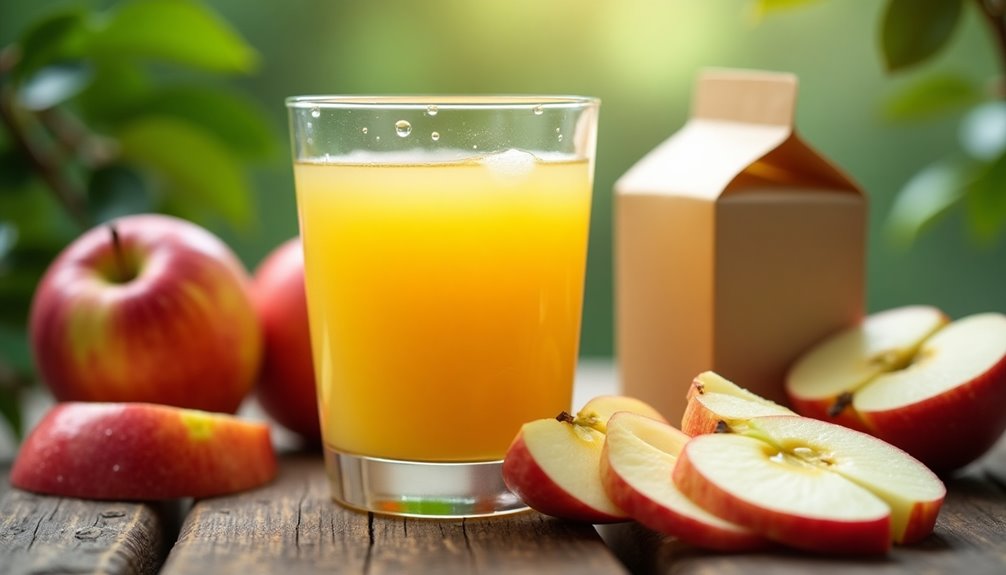
Have you ever wondered how long your apple juice stays fresh after you crack it open? It's a common question, especially if you love sipping on that sweet, refreshing drink. Once you open a container, the clock starts ticking, and knowing how long it lasts can help you avoid any unpleasant surprises.
When it comes to store-bought apple juice, you can generally expect it to last about 7 to 10 days in the refrigerator. That's assuming you store it properly, of course. Keeping it cold is crucial because refrigeration slows down spoilage. If you notice any signs of spoilage, like off odors or discoloration, it's better to be safe than sorry—just toss it out.
If you're dealing with canned apple juice, the guidelines are pretty similar. Once you open a can, it's best to consume it within 10 days. The same rules apply; refrigeration is key to maintaining its freshness and safety. Canned apple juice can be quite convenient, but don't forget to check for those signs of spoilage after opening. It's easy to lose track of time and miss that window.
Now, let's talk about cold-pressed apple juice. This juice is gaining popularity for its natural flavor and lack of preservatives, but that also means it's more perishable. Once you open a bottle of cold-pressed apple juice, you've got a short window of just 2 to 3 days to enjoy it. The absence of preservatives makes it deliciously fresh but also more susceptible to spoilage. So, if you opt for this tasty option, don't hesitate—drink it up quickly!
Homemade apple juice is another story. If you’ve made your own batch, it can last an additional day or two, especially if you’ve added some acidity like lemon juice. However, it’s still best to consume it as soon as possible. Homemade means no preservatives, and that makes it more fragile. Always keep an eye out for any signs of spoilage, as they can appear quickly. To extend its freshness, store homemade apple juice in an airtight container in the refrigerator. Be mindful that while homemade apple juice may last a couple of days longer than store-bought varieties, it still doesn’t compare to the shelf stability found in products like aloe vera juice shelf life, which can often last for months due to its preservatives and processing methods. Ultimately, enjoying your homemade juice within its prime is key for the best taste and quality.
In all cases, remember that proper storage is vital. Keeping your apple juice refrigerated is the best way to extend its lifespan. Even if you've opened it, a cold environment can help delay spoilage. When you pour yourself a glass, take a moment to check for any signs of spoilage—better safe than sorry!
Frequently Asked Questions
Does Apple Juice Go Bad After Opening?
Yes, apple juice can go bad after you open it. Once you've cracked that seal, it starts to lose freshness.
You'll want to check for signs of spoilage, like off odors, mold, or changes in color. If you keep it properly sealed and refrigerated, it can last about a week, but cold-pressed varieties are best consumed within a couple of days for optimal taste.
Always trust your senses when assessing its quality!
How Long Does Open Juice Last in the Fridge?
You might wonder just how long open juice lasts in your fridge. Generally, it's safe to drink for about 7 to 10 days, but it can vary based on the type.
Cold-pressed juices spoil faster, often lasting only 2 to 3 days. To keep your juice fresh, make sure you seal the container tightly after each pour.
Always check for any off smells or changes before you take a sip to ensure it's still good!
How Long Is Martinelli's Apple Juice Good for Once Opened?
When you open a bottle of Martinelli's apple juice, it's best to enjoy it within 7 to 10 days.
Store it tightly sealed in the refrigerator to keep it fresh and prevent oxidation.
If you leave it out at room temperature for more than 2 hours, toss it for safety.
Always check for signs of spoilage like off-odor or discoloration before drinking.
Enjoy that delicious juice while it's at its best!
How Do You Know if Juice Has Gone Bad?
Imagine opening a treasure chest filled with golden nectar.
To ensure it remains a delight, you've got to watch for signs of decay. If you spot mold or clouds, that treasure's turned to dust. A sour aroma or taste? That's a warning bell!
If the container bulges, it's a sign of fermentation—best to toss it.
Regularly checking aroma, flavor, and appearance keeps your treasure safe and your taste buds happy.
Conclusion
In conclusion, once you've popped that apple juice carton open, you've got about 7 to 10 days before it turns into a science experiment! It's like a ticking time bomb of flavor, so don't let it sit around like a forgotten relic. Treat it like gold and sip it down within the week for the best taste. Remember, every drop counts, and you wouldn't want to waste liquid happiness, would you? So, drink up and enjoy!
Cindy thoroughly researches juicing trends, techniques, and recipes to provide readers with practical advice and inspiration. Her writing style is accessible, engaging, and designed to make complex concepts easy to understand. Cindy’s dedication to promoting the advantages of juicing shines through her work, empowering readers to make positive changes in their lives through the simple act of juicing.

